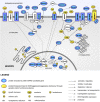Gene-set and multivariate genome-wide association analysis of oppositional defiant behavior subtypes in attention-deficit/hyperactivity disorder
- PMID: 26184070
- PMCID: PMC4715802
- DOI: 10.1002/ajmg.b.32346
Gene-set and multivariate genome-wide association analysis of oppositional defiant behavior subtypes in attention-deficit/hyperactivity disorder
Abstract
Oppositional defiant disorder (ODD) is a frequent psychiatric disorder seen in children and adolescents with attention-deficit-hyperactivity disorder (ADHD). ODD is also a common antecedent to both affective disorders and aggressive behaviors. Although the heritability of ODD has been estimated to be around 0.60, there has been little research into the molecular genetics of ODD. The present study examined the association of irritable and defiant/vindictive dimensions and categorical subtypes of ODD (based on latent class analyses) with previously described specific polymorphisms (DRD4 exon3 VNTR, 5-HTTLPR, and seven OXTR SNPs) as well as with dopamine, serotonin, and oxytocin genes and pathways in a clinical sample of children and adolescents with ADHD. In addition, we performed a multivariate genome-wide association study (GWAS) of the aforementioned ODD dimensions and subtypes. Apart from adjusting the analyses for age and sex, we controlled for "parental ability to cope with disruptive behavior." None of the hypothesis-driven analyses revealed a significant association with ODD dimensions and subtypes. Inadequate parenting behavior was significantly associated with all ODD dimensions and subtypes, most strongly with defiant/vindictive behaviors. In addition, the GWAS did not result in genome-wide significant findings but bioinformatics and literature analyses revealed that the proteins encoded by 28 of the 53 top-ranked genes functionally interact in a molecular landscape centered around Beta-catenin signaling and involved in the regulation of neurite outgrowth. Our findings provide new insights into the molecular basis of ODD and inform future genetic studies of oppositional behavior. © 2015 The Authors. American Journal of Medical Genetics Part B: Neuropsychiatric Genetics Published by Wiley Periodicals, Inc.
Keywords: GWAS; ODD; irritability; neurite outgrowth; β-catenin.
© 2015 The Authors. American Journal of Medical Genetics Part B: Neuropsychiatric Genetics Published by Wiley Periodicals, Inc.
Figures



References
-
- Aebi M, Muller UC, Asherson P, Banaschewski T, Buitelaar J, Ebstein R, Eisenberg J, Gill M, Manor I, Miranda A, Oades RD, Roeyers H, Rothenberger A, Sergeant J, Sonuga‐Barke E, Thompson M, Taylor E, Faraone SV, Steinhausen HC. 2010. Predictability of oppositional defiant disorder and symptom dimensions in children and adolescents with ADHD combined type. Psychol Med 40:2089–2100. - PubMed
-
- Aebi M, Plattner B, Winkler Metzke C, Bessler C, Steinhausen HC. 2013. Parent‐ and self‐reported dimensions of oppositionality in youth: Construct validity, comorbidity and criminal outcomes in adulthood. J Child Psychol Psychiatry 54:941–949. - PubMed
-
- Angold A, Costello EJ, Erkanli A. 1999. Comorbidity. J Child Psychol Psychiatry 40:57–87. - PubMed
Publication types
MeSH terms
Grants and funding
LinkOut - more resources
Full Text Sources
Other Literature Sources
Medical

